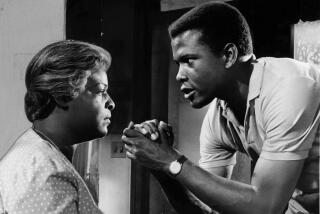Very Post-Mortem Exams
- Share via
Had you been in Baltimore on Friday, you could have sneaked your way in to one of the country’s oldest medical buildings (Davidge Hall, at the University of Maryland). Sitting cheek by jowl with 200 doctors and students, you would have finally learned what killed Herod the Great, the king of ancient Judea known as the infamous “slaughterer of the innocents.”
The annual “historical clinicopathological conference,” sponsored by Maryland’s Department of Veterans Affairs and the University of Maryland, is a fun meet where doctors of various stripes discuss how this or that famous person met his end. Did Edgar Allen Poe die of alcohol withdrawal or was it possibly rabies? What offed Ludwig van Beethoven, Wolfgang Amadeus Mozart, the Roman emperor Claudius or the Athenian statesman Pericles?
This was the conference’s eighth year, says organizer Dr. Philip Mackowiak. Normally, such meets (which help medical students and residents hone their diagnostic skills) involve less-famous folks and more recent deaths.
A chosen doctor, called the “discussant,” presents the facts of a case to an audience of doctors and students, then delivers his or her diagnosis. A general chin-wag ensues.
This particular meeting is much the same--except that Mackowiak happened to be reading about Edgar Allan Poe’s death some years back and playfully decided to start a meeting with a historical bent. He picked Poe as the first subject, in 1995. No one was told they were dealing with someone famous, but it didn’t take long for the discussant to figure it out.
These days, “it’s become such a major production and everybody knows it’s a historical clinicopathological conference,” Mackowiak says. “The exercise now is to figure out who the person is and come up with a diagnosis.”
Dr. Jan Hirschmann, this year’s discussant, was assigned King Herod as a subject--and a grisly-sounding demise to dissect. Herod’s death was preceded by severe itching, gut pain, convulsions, breathlessness and (as if those weren’t enough) gangrene of the genitalia. Some people, noted Hirschmann, think Herod died from gonorrhea. Hirschmann begged to differ, concluding that itching and most of the king’s other symptoms were better explained by chronic kidney failure. (The only ill-fitting fact was that nasty gangrene; Hirschmann proposed that Herod also had an infection called Fournier’s gangrene.)
Here are a few other famous people and diagnoses from prior years:
* Mozart. He died at age 35 with a whole slew of symptoms, including fever, sweats, a rash and severe bodily swelling--and doctors through the years have blamed everything from tuberculosis to syphilis. The discussant, in reviewing the case, focused on the swelling--which can be caused by liver disease, kidney disease or heart failure. Liver disease was out (no jaundice), kidney disease was discounted too (no delirium early in the disease). The verdict was congestive heart failure, probably caused by the rheumatic fever sweeping Vienna at the time.
* Claudius, emperor of Rome. He died in AD 54 after a meal of mushrooms, first suffering pain, diarrhea, low blood pressure and difficulty breathing--likely from the fungal toxin muscarine. But he also had a nervous system problem called dystonia, says Mackowiak, and this neurological condition might have given the toxin more clout.
* Greek politician Pericles. He met his end during the plague of Athens during the 5th century BC, and it’s been suggested that the epidemic, which led to the end of the city’s golden age, was caused by anything from bubonic plague to ebola virus. But the diagnosis at the conference was typhus.
* Gen. George A. Custer. Custer, of the U.S. Cavalry, of course, was killed at the Battle of Little Bighorn during that famous “last stand” against the Indians. But did another condition help his death along? “He was a very, very famous figure and a very successful general but he orchestrated the greatest defeat in the history of the United States Army at the hands of Native Americans,” says Mackowiak. “The question became, ‘Was he unbalanced?’”
A careful review of the historical literature suggests he didn’t have any major psychopathology but was certainly on the flamboyant side and might have had a slight personality disorder.
You can read more about Custer (and also find out what killed Beethoven and Poe) at www.va-umd.org/pages/main.htm.
*
If you have an idea for a Booster Shots topic, write or e-mail Rosie Mestel at the Los Angeles Times, 202 W. 1st. St., L.A., CA 90012, rosie.mestel@latimes.com.
More to Read
Sign up for The Wild
We’ll help you find the best places to hike, bike and run, as well as the perfect silent spots for meditation and yoga.
You may occasionally receive promotional content from the Los Angeles Times.






